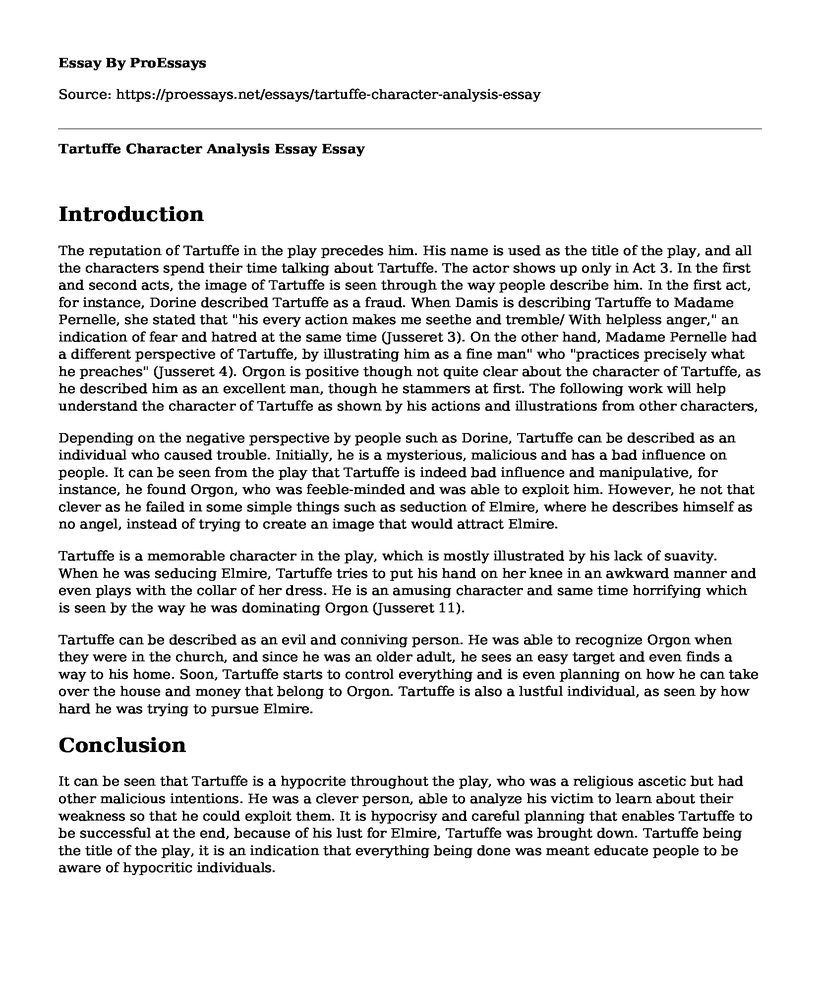Introduction
The reputation of Tartuffe in the play precedes him. His name is used as the title of the play, and all the characters spend their time talking about Tartuffe. The actor shows up only in Act 3. In the first and second acts, the image of Tartuffe is seen through the way people describe him. In the first act, for instance, Dorine described Tartuffe as a fraud. When Damis is describing Tartuffe to Madame Pernelle, she stated that "his every action makes me seethe and tremble/ With helpless anger," an indication of fear and hatred at the same time (Jusseret 3). On the other hand, Madame Pernelle had a different perspective of Tartuffe, by illustrating him as a fine man" who "practices precisely what he preaches" (Jusseret 4). Orgon is positive though not quite clear about the character of Tartuffe, as he described him as an excellent man, though he stammers at first. The following work will help understand the character of Tartuffe as shown by his actions and illustrations from other characters,
Depending on the negative perspective by people such as Dorine, Tartuffe can be described as an individual who caused trouble. Initially, he is a mysterious, malicious and has a bad influence on people. It can be seen from the play that Tartuffe is indeed bad influence and manipulative, for instance, he found Orgon, who was feeble-minded and was able to exploit him. However, he not that clever as he failed in some simple things such as seduction of Elmire, where he describes himself as no angel, instead of trying to create an image that would attract Elmire.
Tartuffe is a memorable character in the play, which is mostly illustrated by his lack of suavity. When he was seducing Elmire, Tartuffe tries to put his hand on her knee in an awkward manner and even plays with the collar of her dress. He is an amusing character and same time horrifying which is seen by the way he was dominating Orgon (Jusseret 11).
Tartuffe can be described as an evil and conniving person. He was able to recognize Orgon when they were in the church, and since he was an older adult, he sees an easy target and even finds a way to his home. Soon, Tartuffe starts to control everything and is even planning on how he can take over the house and money that belong to Orgon. Tartuffe is also a lustful individual, as seen by how hard he was trying to pursue Elmire.
Conclusion
It can be seen that Tartuffe is a hypocrite throughout the play, who was a religious ascetic but had other malicious intentions. He was a clever person, able to analyze his victim to learn about their weakness so that he could exploit them. It is hypocrisy and careful planning that enables Tartuffe to be successful at the end, because of his lust for Elmire, Tartuffe was brought down. Tartuffe being the title of the play, it is an indication that everything being done was meant educate people to be aware of hypocritic individuals.
Work Cited
Jusseret, Kathy. Tartuffe by Moliere. Place of publication not identified: Primento Digital, 2016. Internet resource.
Cite this page
Tartuffe Character Analysis Essay. (2022, Jun 10). Retrieved from https://proessays.net/essays/tartuffe-character-analysis-essay
If you are the original author of this essay and no longer wish to have it published on the ProEssays website, please click below to request its removal:
- Black Mirror Episode 1 Season 5
- Essay Example on Mixed Genres: Borges and Postmodernism's Art of Storytelling
- Assignment Example on German Romanticism
- Essay Example on The Beatles: The Greatest Rock and Roll Band of All Time
- Paper Example on Aldous Huxley's 'Brave New World': Tech's Pros & Cons
- Joy Harjo: A Poet of Nature, Grit, and Grief - Essay Sample
- Synthesis Paper Example on Social Media in Education







